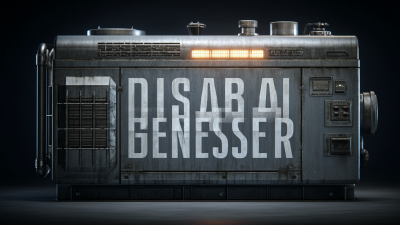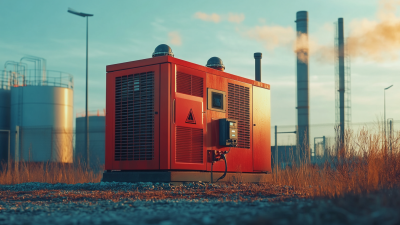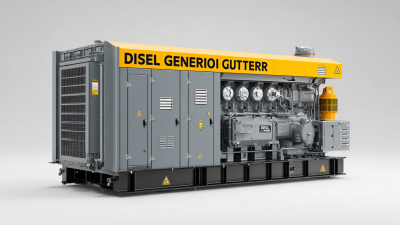
-
Home
-
Products
-
Service
-
About Us
-
Solution
-
Videos
-
News
-
Contact Us
Leave Your Message

In today's rapidly evolving energy landscape, the demand for reliable backup power solutions is more critical than ever, especially for businesses and facilities that cannot afford downtime. Standby Diesel Generators have historically been a go-to choice, providing robust and dependable power during outages. According to a report by Market Research Future, the global market for diesel generators is projected to grow at a CAGR of 5.5% from 2020 to 2027, highlighting their enduring relevance. However, with advancements in technology and a shift towards sustainable energy practices, many organizations are exploring alternatives. This checklist-style blog will evaluate various backup power solutions, emphasizing the pros and cons of each, to help you determine which option is best suited for your specific needs. Whether you’re considering renewable energy sources, battery backup systems, or hybrid solutions, understanding the landscape of backup power alternatives is essential for informed decision-making.

In today’s fast-paced world, the importance of backup power solutions cannot be overstated. According to a report by the U.S. Department of Energy, power outages cost American businesses approximately $150 billion annually. This startling figure underscores the critical need for reliable backup systems to maintain operational continuity in various sectors, from healthcare to information technology. In recent years, the demand for alternatives to traditional standby diesel generators has surged, driven by factors such as environmental concerns and advancements in technology.
As businesses and residential users increasingly seek greener options, alternatives like battery energy storage systems (BESS) and portable solar generators have gained traction. A report by BloombergNEF projects that the global energy storage market will reach $620 billion by 2040, highlighting the shift towards sustainable backup power solutions. These modern alternatives not only provide efficient power but also significantly reduce carbon footprints compared to conventional diesel generators. As we navigate the challenges of climate change and strive for energy resilience, understanding and investing in the right backup power solutions has become a necessity for ensuring a stable and sustainable future.
As the demand for reliable backup power solutions continues to grow, the market for diesel generators in India is expected to reach a valuation of $1.47 billion in 2024 and grow to $2.59 billion by 2032, exhibiting a compound annual growth rate (CAGR) of 7.39%. This trend highlights the increasing reliance on traditional diesel generators, especially in sectors where uninterrupted power is critical. However, with the rise of alternative power sources, such as battery storage and solar energy, there is a growing interest in exploring viable options beyond conventional diesel generators.
The recent influx of industry giants into the outdoor energy storage market indicates a shift towards more sustainable and innovative solutions. With advancements in mobile power technology driven by the demand for fast-charging mobile devices, alternative sources are becoming increasingly competitive. The diesel generator industry is also seeing a trend toward smart, green, and high-end solutions, adapting to the evolving needs of consumers. This drive for modernization ultimately raises an important question: which backup power solution is right for you, considering both traditional diesel options and emerging alternatives?
This chart compares the initial costs of various backup power solutions, highlighting the advantages and disadvantages of traditional diesel generators versus alternative power sources. The information can help you choose the right backup power solution for your needs.
As the world pivots towards sustainable energy solutions, exploring renewable options for backup power systems has never been more critical. Traditional standby diesel generators, while reliable, are increasingly being scrutinized for their environmental impact. According to the International Renewable Energy Agency (IRENA), a shift to renewable backup systems can reduce greenhouse gas emissions by up to 70%. This statistic highlights the urgent need for businesses and homeowners to consider greener alternatives, such as solar and wind power systems.
When opting for renewable energy solutions, it's important to assess your specific energy needs and local resources. For instance, solar power systems can be highly effective in regions with ample sunlight, not only providing backup power but also reducing overall energy costs. A 2020 National Renewable Energy Laboratory (NREL) report found that residential solar can save homeowners an average of $20,000 over 20 years. Additionally, lithium-ion battery storage can ensure energy availability even during periods of low generation.
**Tips:** Before investing in renewable backup systems, consult with local energy experts to conduct a feasibility study. Assess the amount of energy you typically use during outages, as this insight will guide the appropriate sizing of your renewable system. Look for incentives and tax credits that can significantly reduce installation costs and enhance the return on your investment.
When it comes to backup power solutions, evaluating cost-effectiveness is crucial for both residential and commercial users. Standby diesel generators have long been favored for their reliability, but the high operational and maintenance costs can be a burden. Exploring alternatives such as battery storage systems and solar power can provide significant savings over time. For instance, while the initial investment for solar panels may be high, the decreasing costs and potential for government incentives make them a viable option for many. Additionally, battery storage allows users to harness renewable energy, ensuring they have power during outages without the noise and pollution associated with diesel generators.
Another alternative worth considering is portable generators. These units typically have a lower purchase price and can be an excellent choice for those who need temporary power solutions. However, users must account for fuel costs and the limited run time of these generators. On the other hand, grid-tied backup systems may offer a cost-effective solution by relying on existing infrastructure, allowing for quick transitions to backup power. Ultimately, choosing the right backup power solution involves not just looking at immediate costs but also long-term sustainability and reliability—factors that significantly impact overall efficiency and savings.
When choosing the right backup power solution for your specific needs, it’s essential to consider the various options available in today’s market. Standby diesel generators have long been a reliable choice, but advancements in technology have led to alternatives that may better suit individual requirements. For instance, recent reports indicate that the demand for home generators has surged, particularly in response to increasing weather-related power outages. In 2023 alone, nearly 40% of homeowners reported investing in backup power systems, driven by the rising trend of natural disasters.
Solar-powered generators are gaining traction due to their eco-friendliness and the ability to generate power independently of the grid. As we look ahead to 2025, the best solar batteries are becoming a crucial pairing for these systems, allowing for energy storage that can sustain critical devices during outages. Additionally, portable power stations provide flexibility, enabling users to keep essential electronics operational during emergencies, regardless of their location. Industry experts recommend assessing your energy needs carefully, as selecting the right battery backup system is pivotal in ensuring reliability during winter storms and extended outages.





